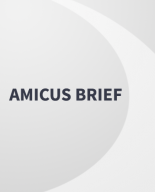- Amicus Briefs
USCIS Should Accept Provisional Degree Certificate as Proof Degree Was Received for Advanced Degree Professionals
Published
The Council filed an amicus brief in a case pending before the Administrative Appeals Office (AAO), an administrative body at U.S. Citizenship and Immigration Services (USCIS) that reviews denials of most employment-based visa petitions. For the “advanced degree professional” employment-based second preference immigrant visa category (EB-2), the employer’s educational requirement for the job offered must be at least a master’s degree or the equivalent. Consistent with congressional intent, USCIS accepts a bachelor’s degree followed by five years of progressive experience in the foreign national’s specialty as the equivalent of a master’s degree. However, USCIS has not been consistent as to what evidence it will accept as proof that the foreign national has received a bachelor’s degree. In this case, the foreign national had a Provisional Degree Certificate, commonly issued by universities in India, indicating that she qualified for the award of a bachelor’s degree. In India, the diploma ceremony can be months or years after the graduate qualifies for the degree. This foreign national’s diploma was issued in February 2009. Using that date and rejecting the Provisional Degree Certificate and other evidence that she had met the degree requirements months earlier, USCIS concluded that the foreign national was 65 days short of having the five years of post-degree experience and thus lacked the equivalent of an advanced degree.

